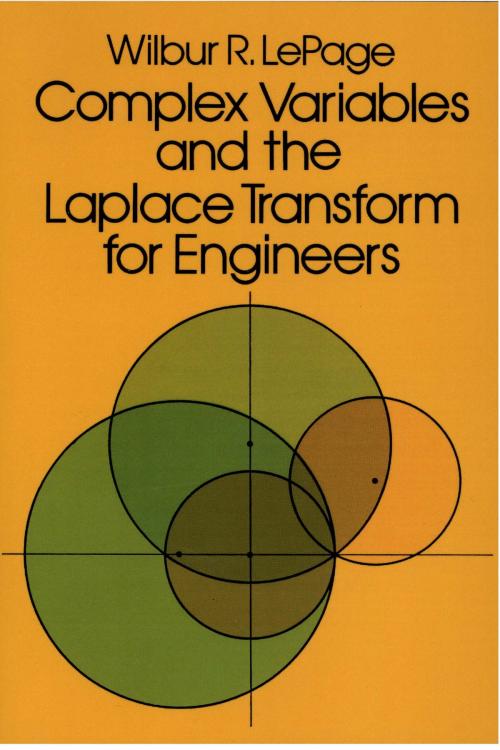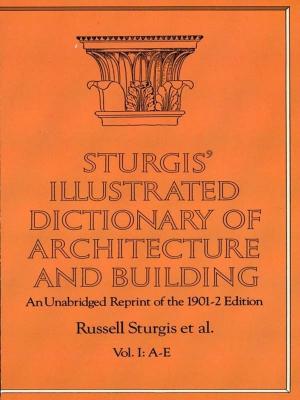Complex Variables and the Laplace Transform for Engineers
Nonfiction, Science & Nature, Technology, Electronics| Author: | Wilbur R. LePage | ISBN: | 9780486136448 |
| Publisher: | Dover Publications | Publication: | April 26, 2012 |
| Imprint: | Dover Publications | Language: | English |
| Author: | Wilbur R. LePage |
| ISBN: | 9780486136448 |
| Publisher: | Dover Publications |
| Publication: | April 26, 2012 |
| Imprint: | Dover Publications |
| Language: | English |
"An excellent text; the best I have found on the subject." — J. B. Sevart, Department of Mechanical Engineering, University of Wichita
"An extremely useful textbook for both formal classes and for self-study." — Society for Industrial and Applied Mathematics
Engineers often do not have time to take a course in complex variable theory as undergraduates, yet is is one of the most important and useful branches of mathematics, with many applications in engineering. This text is designed to remedy that need by supplying graduate engineering students (especially electrical engineering) with a course in the basic theory of complex variables, which in turn is essential to the understanding of transform theory. Presupposing a good knowledge of calculus, the book deals lucidly and rigorously with important mathematical concepts, striking an ideal balance between purely mathematical treatments that are too general for the engineer, and books of applied engineering which may fail to stress significant mathematical ideas.
The text is divided into two basic parts: The first part (Chapters 1–7) is devoted to the theory of complex variables and begins with an outline of the structure of system analysis and an explanation of basic mathematical and engineering terms. Chapter 2 treats the foundation of the theory of a complex variable, centered around the Cauchy-Riemann equations. The next three chapters — conformal mapping, complex integration, and infinite series — lead up to a particularly important chapter on multivalued functions, explaining the concepts of stability, branch points, and riemann surfaces. Numerous diagrams illustrate the physical applications of the mathematical concepts involved.
The second part (Chapters 8–16) covers Fourier and Laplace transform theory and some of its applications in engineering, beginning with a chapter on real integrals. Three important chapters follow on the Fourier integral, the Laplace integral (one-sided and two-sided) and convolution integrals. After a chapter on additional properties of the Laplace integral, the book ends with four chapters (13–16) on the application of transform theory to the solution of ordinary linear integrodifferential equations with constant coefficients, impulse functions, periodic functions, and the increasingly important Z transform.
Dr. LePage's book is unique in its coverage of an unusually broad range of topics difficult to find in a single volume, while at the same time stressing fundamental concepts, careful attention to details and correct use of terminology. An extensive selection of interesting and valuable problems follows each chapter, and an excellent bibliography recommends further reading. Ideal for home study or as the nucleus of a graduate course, this useful, practical, and popular (8 printings in its hardcover edition) text offers students, engineers, and researchers a careful, thorough grounding in the math essential to many areas of engineering. "An outstanding job." — American Mathematical Monthly
"An excellent text; the best I have found on the subject." — J. B. Sevart, Department of Mechanical Engineering, University of Wichita
"An extremely useful textbook for both formal classes and for self-study." — Society for Industrial and Applied Mathematics
Engineers often do not have time to take a course in complex variable theory as undergraduates, yet is is one of the most important and useful branches of mathematics, with many applications in engineering. This text is designed to remedy that need by supplying graduate engineering students (especially electrical engineering) with a course in the basic theory of complex variables, which in turn is essential to the understanding of transform theory. Presupposing a good knowledge of calculus, the book deals lucidly and rigorously with important mathematical concepts, striking an ideal balance between purely mathematical treatments that are too general for the engineer, and books of applied engineering which may fail to stress significant mathematical ideas.
The text is divided into two basic parts: The first part (Chapters 1–7) is devoted to the theory of complex variables and begins with an outline of the structure of system analysis and an explanation of basic mathematical and engineering terms. Chapter 2 treats the foundation of the theory of a complex variable, centered around the Cauchy-Riemann equations. The next three chapters — conformal mapping, complex integration, and infinite series — lead up to a particularly important chapter on multivalued functions, explaining the concepts of stability, branch points, and riemann surfaces. Numerous diagrams illustrate the physical applications of the mathematical concepts involved.
The second part (Chapters 8–16) covers Fourier and Laplace transform theory and some of its applications in engineering, beginning with a chapter on real integrals. Three important chapters follow on the Fourier integral, the Laplace integral (one-sided and two-sided) and convolution integrals. After a chapter on additional properties of the Laplace integral, the book ends with four chapters (13–16) on the application of transform theory to the solution of ordinary linear integrodifferential equations with constant coefficients, impulse functions, periodic functions, and the increasingly important Z transform.
Dr. LePage's book is unique in its coverage of an unusually broad range of topics difficult to find in a single volume, while at the same time stressing fundamental concepts, careful attention to details and correct use of terminology. An extensive selection of interesting and valuable problems follows each chapter, and an excellent bibliography recommends further reading. Ideal for home study or as the nucleus of a graduate course, this useful, practical, and popular (8 printings in its hardcover edition) text offers students, engineers, and researchers a careful, thorough grounding in the math essential to many areas of engineering. "An outstanding job." — American Mathematical Monthly















